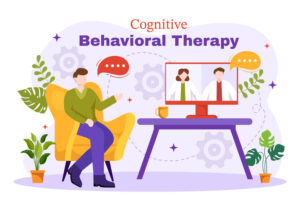In a world where stress, anxiety, and depression are all too common, it can be important to know about effective interventions that can help manage these challenges. One such intervention is Cognitive Behavioral Therapy (CBT), a widely used and highly effective approach in the field of mental health (Better Health Channel, 2022). But what exactly is CBT, and how does it work?
What is CBT?
Cognitive Behavioral Therapy is a form of psychotherapy that focuses on changing patterns of thinking and behaviour that contribute to emotional distress. CBT primarily concentrates on the present moment and aims to equip individuals with practical strategies to tackle their current difficulties.
How Does CBT Work?
CBT operates on the principle that our thoughts, feelings, and behaviours are interconnected. It suggests that by changing our thoughts and behaviours, we can alter our emotional responses to situations. Here’s how it typically works:
Identifying Patterns: The first step in CBT is to recognize negative patterns of thinking and behaviour that contribute to distress. This involves becoming aware of automatic thoughts and cognitive distortions, such as catastrophizing or black-and-white thinking.
Modifying/Questioning Beliefs and Thoughts: Once identified, these negative thought patterns are questioned and examined for accuracy (How accurate is the thought?), utility (How helpful is the thought?), and consistency (Have there been times where thinking has been different?). Individuals learn to question the evidence supporting these beliefs and develop more balanced and realistic perspectives.
Behavioural Techniques: In addition to addressing thoughts, CBT also incorporates behavioural techniques to promote change. This may involve gradually exposing individuals to feared situations (exposure therapy) or teaching specific coping skills, such as relaxation techniques or problem-solving strategies.
Practice and Reinforcement: Through consistent practice and reinforcement of new skills, individuals learn to apply these techniques in their daily lives.
Evidence for Effectiveness
Numerous scientific studies have demonstrated the effectiveness of CBT across a range of mental health conditions, including:
Depression: CBT has been shown to be as effective as antidepressant medication in treating depression (DeRubeis et al., 1999), and its benefits often endure long after treatment has ended (Williams, 1997).
Anxiety and Related Disorders: CBT is considered the gold standard treatment for various anxiety disorders, such as panic disorder, social anxiety disorder, generalized anxiety disorder, obsessive-compulsive disorder, posttraumatic stress disorder, prolonged grief, and phobia (Curtiss et al., 2021).
Final Thoughts
Cognitive Behavioral Therapy offers a practical and evidence-based approach to addressing a wide range of mental health challenges. By empowering individuals to identify and change negative thought patterns and behaviours, CBT equips them with valuable tools to manage their emotions and improve their quality of life. If you or someone you know is struggling with mental health issues, consider reaching out to a qualified mental health professional. Remember, you don’t have to face these challenges alone, and help is available.
Author: Linh Nguyen, B Psychology (Hons), MClinPsych
Linh is a General Psychologist at Vision and M1 Psychology. Her educational background includes a Bachelor of Psychological Science (Hons), and she has completed her Postgraduate Master’s Degree in Clinical Psychology.
To make an appointment with Linh Nguyen try Online Booking. Alternatively, you can call M1 Psychology Loganholme on (07) 3067 9129.
References
Beck, J. S. (1995). Cognitive Therapy: Basics and Beyond. Guilford Press.
Better Health Channel. (2022, February 24). Cognitive Behaviour Therapy. https://www.betterhealth.vic.gov.au/health/conditionsandtreatments/cognitive-behaviour-therap
Curtiss, J. E., Levine, D. S., Ander, I., & Baker, A. W. (2021). Cognitive-behavioral treatments for anxiety and stress-related disorders. Focus, 19(2), 184-189.
DeRubeis, R.J., Gelfand, L.A., Tang, T.Z., & Simons, A.D. (1999). Medications versus cognitive-behaviour therapy for severely depressed outpatients: Meta-analysis of four randomized comparisons. American Journal of Psychiatry, 156, 1007-1013.
Williams, J. M. G. (1997). Depression. In D.M. Clark & C.G. Fairburn (eds). Science and Practice of Cognitive Behaviour Therapy. Oxford: Oxford University Press.

